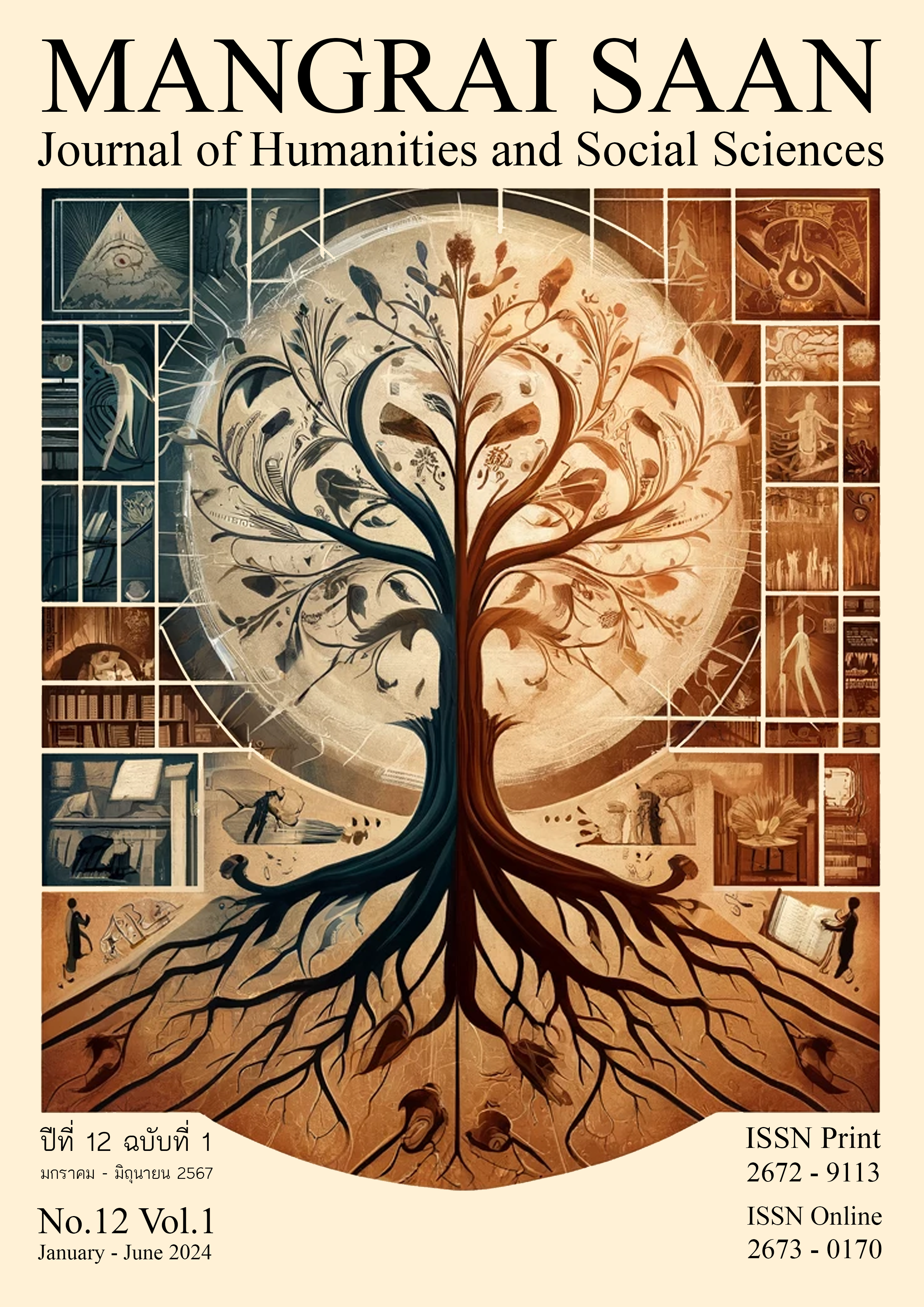In Family We Trust : The analysis of the impact that men receive from a Patriarchy society
Main Article Content
Abstract
This research aims to study the impact that men receive from a patriarcha society through television dramas and characters in the TV series "In Family We Trust" (2018). The analysis focuses on four male characters, namely Prasert, Meth, Pete, and Kway Teow. Prasert and Meth represent second-generation characters (sons), while Pete and Kway Teow represent third-generation characters (grandsons). The research is conducted using a qualitative methodology approach that analyzes the male characters in the TV series "In Family We Trust" based on the theory of male dominance and psychoanalytic concepts. The study found that the impact men receive from a Patriarchy society can be divided into two groups: based on age and based on gender roles. The impact based on age is evident in the fact that individuals who are born earlier or are older, especially older males like the firstborn sons of the family or the first grandsons of the eldest son, tend to have greater age influence compared to siblings in the same generation. This is also influenced by the transmission of expectations that result from family upbringing. Families of older males often pass on higher expectations for life success than families of younger males. The impact based on gender roles includes the impact of men on other men, the impact of older females on younger males, and the impact that comes from family dynamics. All of these impacts are a result of the patriarchal tradition within families that pass down and exert pressure from generation to generation. This pressure is intended to stimulate the other party to develop themselves for the better or to achieve higher goals.
Article Details

This work is licensed under a Creative Commons Attribution-NonCommercial-NoDerivatives 4.0 International License.
The authors should ensure all the contents and information of the articles published in Mangraisaan. The editors do not share any related responsibility.
References
เกษม ปราณีธยาศัย. (2544). ผู้ชายในครอบครัวจีน กรณีศึกษา : ครอบครัวคนจีนแต้จิ๋วใน ตำบลมหาชัย อำเภอเมือง จังหวัดสมุทรสาคร. วิทยานิพนธ์ปริญญาศิลปศาสตรมหาบัณฑิต มหาวิทยาลัยศิลปากร.
ณรงค์กรรณ รอดทรัพย์. (2555). ปิตาธิปไตย : ภาพสะท้อนแห่งความไม่เสมอภาคระหว่างชายหญิงในสังคมเอเชีย. วารสารวิชาการ มหาวิทยาลัยราชภัฏบุรีรัมย์, 4(2), 30-46.
เดโช สวนานนท์. (2519). จิตวิทยาทั่วไป. กรุงเทพฯ : โอเดียนสโตร์.
ธนวัฒน์ ปัญญานันท์ และ ถิรวัฒน์ วรรณพฤกษ์. (2565). ผีผู้ชายกับความอ่อนแอของความเป็นชายในสังคมปิตาธิปไตยไทย กรณีศึกษา ภาพยนต์เรื่องโรงแรมผี (2545) เดอะเลตเตอร์ เขียนเป็นส่งตาย (2549) และผีไม้จิ้มฟัน (2550). วารสารการสื่อสารมวลชน มหาวิทยาลัยเชียงใหม่, 10(1), 325-354.
ธนสิน ชุตินธรานนท์. (2564). บทรำพึงในนวนิยายไทยเรื่องเลือดข้นคนจาง. วารสารศิลปะศาสตร์ มหาวิทยาลัยแม่โจ้, 9(2), 160-175.
พลากร เจียมธีระนาถ. (2554). วาทกรรมชายเป็นใหญ่ในภาพยนต์ไทยที่ให้ความสำคัญแก่สตรี. ปริญญานิเทศศาสตรมหาบัณฑิต จุฬาลงกรณ์มหาวิทยาลัย.
พาฝัน หน่อแก้ว. (2565). ‘มายาคติ’ และ ‘ความเชื่อ’ ในโลกชายเป็นใหญ่ ที่ยังคงตีตรากดขี่ความเท่าเทียม ทางเพศ. สืบค้น กุมภาพันธ์ 22, 2565 จาก https://themomentum.co/feature-myths-of-gender-equality/
มิเชล ซิมบาลิส โรซัลโด. (1974). ทฤษฎีเกี่ยวกับ ผู้หญิงวัฒนธรรมและสังคม. กรุงเทพฯ: สำนักพิมพ์ศิลปวัฒนธรรม.
เสนาะ เจริญพร. (2548). ผู้หญิงกับสังคมในวรรณกรรมไทยยุคฟองสบู่. กรุงเทพฯ: มติชน.
Bhasin, Kamla. (1993). What is Patriarchy. New Delhi.
Freud, Sigmund. (1921). Group Psychology and The Analysis of the Ego Sigmund Freud. New York: Bantam Books.


